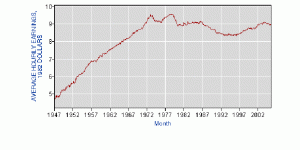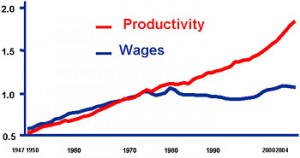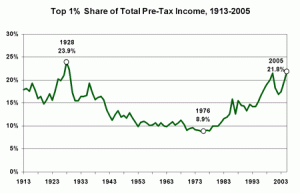
Average Hourly Wages For Goods Producing Workers
What happens if there’s a class war and only one side bothers to show up and fight it? That’s what happened over the last thirty years. There was a class war, and the rich won. Period. It’s over, they kicked our knees out from under us, put on their steel-toed boots and spent the last thirty years telling us that they were going to trickle on us and we’re going to like it and beg for more.
Seems like hyperbole? It’s just the numbers. The top left shows the manufacturing wage earner’s hourly wages. Not “family income” which includes both of you going to work, but hourly wages. The only reason it’s goods producing is they go back longer, but other charts show the same pattern.
So, if you’re an ordinary slob, you haven’t had a raise in over 30 years. In fact, your real wage peaked over 30 years ago and it’s never recovered.

productivity and wages
This would be ok if the US hadn’t been getting richer, getting more productive, ever since then, but I’m sure you won’t be surprised to hear that productivity has kept going up. Yet somehow wages didn’t.
Damon Silvers, whom we can thank for the wages and productivity chart, thinks it has a lot to do with a hostile anti-union environment and with the simultaneous decline of progressive taxation. I’d say he’s got a big part of the picture though not all of it. The key part that he has right is simply that deliberate government policy meant an end to wage increases. Those deliberate government policies benefited the rich greatly, and the people in Washington and New York who made most of the decisions were very close to the people who benefited the most.
The main problem was that real consumption of stuff that requires energy, specifically oil, could not be allowed to increase faster than the combination of oil supply increases and efficiency increases. (We now produce twice the real GDP/barrel of oil we did in the 70s.) If consumption did overtake supply, not only would you get real widespread inflation, but you’d risk losing control over the price of oil.
We saw in 2008 what happens when you lose control over the price of oil.
The second big problem was that the oilarchies who were getting a lot of money with the new, higher price of oil, were not consumer societies and the money they were gaining was not being spread around. Rather it was pooling in the hands of a few nobles, chiefs and robbers, and those folks needed something to spend that money on. Despite what you might expect, trashing hotel rooms, doing blow and buying hookers can only use up a small amount of money, at least when you’re really really stinking rich.
In short, rich oilarchs were sitting on a pile of money and they wanted to buy things with it. Western things. Western…companies. There were two obvious ways for the West to deal with that. You could put on some form of ownership controls, whether formal or informal, or you could make your rich rich enough to compete with the oilarch rich by inflating the value of the paper assets that they were competing over. Europe mostly chose to just say: “No, you can’t buy that.” American elites were smarter though; they realized that this was a chance to become stinking rich. If our rich people were rich enough, they could bid up the price of companies and assets so the oilarchs couldn’t snap them up.
So they made themselves rich. They reduced taxation on themselves in a number of ways, they broke union power, they got rid of old New Deal laws that had stopped speculation from getting too bubblicious and they went on a bubble spree—shoving money into various different asset classes, driving them into the stratosphere, taking the profits and then letting the taxpayer eat the loss. They took as much public infrastructure private as they could and they did so for cents on the dollar. They imported manufactured goods from the East to keep goods inflation down and they exported jobs to low-cost domiciles to keep wage push inflation down.
They also ran, in most periods, very tight dollar policies, so that there were fewer dollars around than the rest of the world needed. Needing dollars badly, people had to sell to the US cheap. And since everyone from outside the US wanted in on whatever the bubble of the day was, they kept giving the US real stuff (oil, goods) for pieces of paper. Those pieces of paper represented something real, at the end of the day: they represented the future. But the future always seems a long way off until suddenly it’s today.
It was a death bet. And back in the late 70’s and late 80’s it was a good bet. Heck, it was even a good bet for many over the last ten years. If you expect to be dead before the bill arrives, who cares how big the bill is? Tim Russert just won that bet. Reagan won that bet. Jesse Helms won that bet. It was a good bet for a lot of powerful men (and a few powerful women) in their late forties or older.
But some people lose death bets, and most people reading this today will lose this bet. You had your chance to die, now you’re going to get to live and pay. I suppose it’s better than the alternative, but I don’t imagine you’re going to enjoy it much.
So look at the last chart and remember: there was a class war. Most Americans never even showed up for it. And the rich won. Now they’re going to try and keep and expand their gains. As Naomi Klein has pointed out at great length, when things go wrong, it’s very easy to sell people snake oil, to take advantage of their fear and their despair.
Roosevelt told the American people not to fear. That there was nothing to fear but fear. Elsewhere other leaders whipped their people into fear, and after fear, into fear-driven aggression and hatred.
Even in lesser crises leaders will appear who offer to solve the problem without telling you how. In the eighties Americans turned from Jimmy Carter, with his negativity and his call to solve fundamental problems in fundamental ways to Reagan, promising “morning in America”. And let’s be honest: Reagan sort of fixed the problems. His fix, in one form or another, lasted almost twenty years, till kid Bush broke it. Sure it wasn’t a permanent fix, and sure it was fixed on the back of the middle and working classes and the cost was not having things like healthcare, the offshoring of huge numbers of jobs and so on. But gas prices went down. Interest rates went down. Inflation was tamed. Suburbs sprouted like weeds. Reagan delivered.
And the rich won their class war.
Reagan was working with a strong America. A fundamentally healthy America. He could afford to run the place down, because it was still in good repair, the baby Boomers were still young, and so on. The cost of Reagan’s “fix” has been that ordinary people haven’t had a raise for over 30 years.
The next such “fix” won’t leave wages even, it will, in real terms, halve them.
Originally posted at FDL on July 13, 2008 in slightly different form. Nothing has changed, except that the next class war is on, and the rich are winning this one, too.


getaclue
Income disparity has been the number one factor in all depressions. When the obscenely rich rob the poor and keep them oppressed, the cycle continues until the poor literally have nothing else to lose. Then the oligarchy starts finding its grandchildren swinging from lampposts and the cycle begins anew.
This time, they have militarized the police and put troops on the streets. “Emergency relocation centers” (aka concentration camps) are rife throughout the country and pending HR 645 would authorize the building of more of these INSIDE military bases. The significance of interring a hostile civilian population on military grounds is that persons held in military facilities are subject to military rule, where the US Constitution DOES NOT APPLY. Persons attempting to make an unauthorized exit from military facilities may be and will be shot on site.
No, this isn’t fiction. It’s happening. You will see the full force of this fascism unleashed when the Obama administration, complicit in all of this (Bush was the bad cop, Obama’s the good cop) eliminates Social Security and Medicare.
Game over, the oligarchy has won.
For now.
James
It’s not going to be a popular point, but I’d like to see the number of women in work on that graph too.
If more people are chasing the same amount of wealth that will reduce wages, right? So now most middle class families require two incomes where in 1950 they would have got by with one.
William
We fought the war. Money lost.
Gawain
How could we have won a war in which we had no spot on the battlefield and no arms in which to fight back. This is the inevitable consequence of an economic war in which the basic premise is that the deck is stacked.
Kurt
James is correct. Look at the graph. In the 70s women began entering the work force. By the mid 1990s the workforce had effectively doubled.
Ian Welsh
I would put it the other way around. Women went to work because they needed to. The workforce didn’t double (taking into account population growth) but it did increase substantially. Maybe I’ll do a post on women in the workforce.